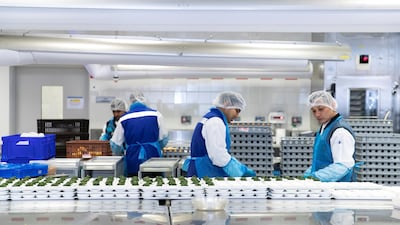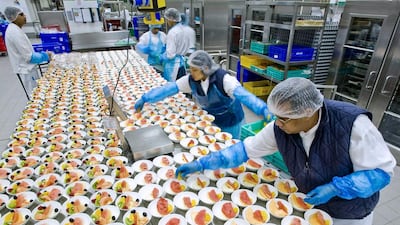Emirates plans to reduce food waste on its flights by more than a third.
In the past year, the airline saved 500 kilograms of fruit, vegetables, bakery items and meat every day by using the food in other areas of the operation.
But it now plans to go further by cutting waste by 35 per cent, using technology to monitor unused food on flights.
The system, named Winnow, uses a camera and a set of smart scales to weigh and register the different foods being thrown in the bin.
The logged information can be used by Emirates to adjust its food orders.
Emirates said decreasing food waste would help conserve fuel and reduce its environmental footprint.
“We are dedicated to investing in the latest technologies to optimise our operations and minimise our environmental footprint,” said Saeed Mohammed, chief executive of Emirates Flight Catering.
“Food waste management has always been an area of focus for EKFC and we have already achieved remarkable results through improved data collection and reporting.”
Last month, Etihad also took steps to reduce food waste on its flights.
The Abu Dhabi airline is tracking its economy-class meals to monitor the number of uneaten dishes on its planes.
A 2017 survey by the International Air Transport Association found that about 1.1 million tonnes of food was wasted from in-flight catering and about 20 per cent of all food produced by in-flight catering teams is wasted every year.
Emirates Flight Catering is one of the world's largest catering operations, preparing more than 80 million meals in the 2019/2020 financial year.














